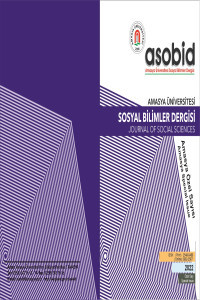ZİHNE “ZİHİNSEL ÖZNE” İLE BAKMANIN İMKÂNI ÜZERİNE
Zihinsel özne, fenomenolojik yöntem, zihin felsefesi, bilinç, özbilinç
ON THE POSSIBILITY OF REGARDING MIND AS A MENTAL SUBJECT
Mental subject, phenomenological method, philosophy of mind, consciousness, self-consciousness,
___
- Arıcı, Murat (2015). Zihinsel Alanda “Ben Hissi” Neye Karşılık Gelir?. Dört Öge, S. 7, s.65-76.
- Arıcı, Murat (2011). Physicalism And The Phenomenal-Physical Gap: Can A Posteriori Necessary Physicalısm Adequately Respond To The Problem Of Phenomenal Subjecthood? Doktora Tezi, Ankara: Orta Doğu Teknik Üniversitesi Sosyal Bilimler Enstitüsü.
- Block, Ned (1978). Troubles with Functionalism. Minnesota Studies in the Philosophy of Science, S. 9, s. 261-325.
- Chalmers, David (1995). Facing Up to the Problem of Consciousness. Journal of Consciousness Studies, S. 2/3, s. 200–219.
- Dennett, Daniel (1999). Aklın Türleri. (çev. Handan Balkara). İstanbul: Varlık Yayınları.
- Gallacher Shaun ve Dan Zahavi (2008). The Phenomenological Mind. USA: Routledge.
- Gulick, Robert Van (2008). Understanding the Phenomenal Mind: Are We All Just Armadillos?. Mind and Cognition: An Anthology. (ed. Lycan W.G.ve Prinz J.J.). Oxford: Blackwell.
- Heil, John (2013). Mental Causation. Mental Causation and Ontology. (ed. S.C. Gibb, E.J. Lowe ve R.D. Ingthorsson). Oxford: Oxford University Press.
- Jackson, Frank (1986). What Mary Didn’t Know?. The Journal of Philosophy, S. 83, s. 291-295.
- Jaegwon, Kim (1998). Philosophy of Mind. New York: Cambridge University Press.
- Ludwig, Kirk (2003). The Mind-Body Problem An Overview. The Blackwell Guide to Philosophy of Mind. USA: Blackwell Publishing.
- Nagel, Thomas (1974). What is it like to be a Bat?. The Philosophical Review. V. 83, No: 4, Durham: Duke University Press. s. 435-450.
- Rakova, Marina (2007). Philosophy of Mind A-Z. Edinburg University Press.
- Searle, John (2006). Zihin, Dil ve Toplum. İstanbul: Litera Yayıncılık.
- Shaffer, Jerome A. (2005). Zihin Felsefesi. (çev. Turan Koç). İstanbul: İz Yayıncılık.
- Zeki, S. & Bartels, A. (1998). The Autonomy Of The Visual Systems And The Modularity Of Conscious Vision. Phil. Trans. R. Soc., V. 353. London.
- Zeman, Adam (2006). Bilinç Kullanım Kılavuzu. (çev. Gürol Koca). İstanbul: Metis Yayınları.
- ISSN: 2548-0480
- Yayın Aralığı: Yılda 2 Sayı
- Başlangıç: 2016
- Yayıncı: Amasya Üniversitesi
KADIN ŞAİRLERDEN MİHRÎ, ŞEREF VE LEYLÂ HANIM GAZELLERİNDE “BEZM”
ZİHNE “ZİHİNSEL ÖZNE” İLE BAKMANIN İMKÂNI ÜZERİNE
İLMÎ MAHLASLI BİR ŞAİRE ATFEDİLEN MANZUM YÜZ HADİS TERCÜMESİ
BERLİN DEVLET KÜTÜPHANESİNDE BULUNAN BİR MECMÛA VE MÜELLİFİ BİLİNMEYEN BİR ESER: ESRÂR-NÂME
TEMETTUAT KAYITLARINA GÖRE AMASYA SANCAĞINDA GÖÇMEN HANELER
Rıza YILDIRIM, İbrahim SERBESTOĞLU
SİYASAL İLETİŞİMİN ETİK KİMLİKLE YENİDEN İNŞASI: İLETİŞİMSEL EYLEM
